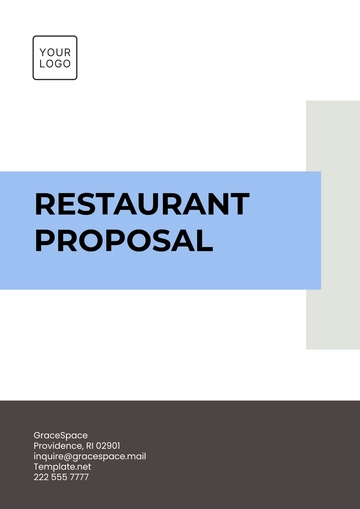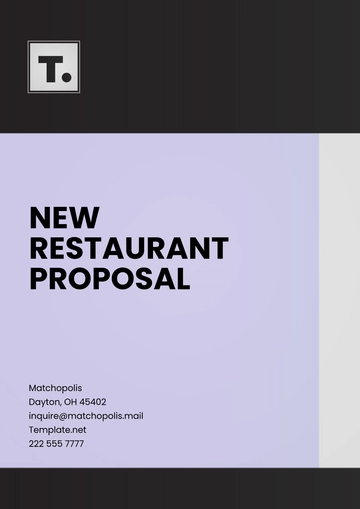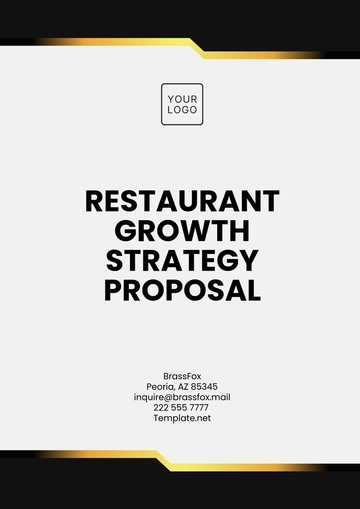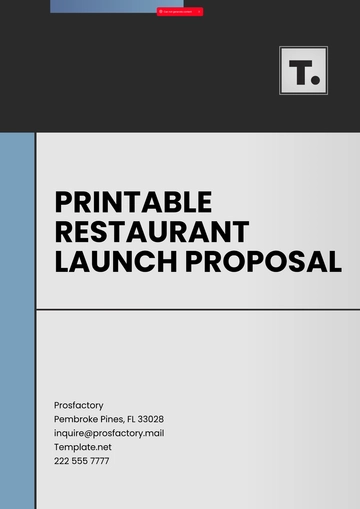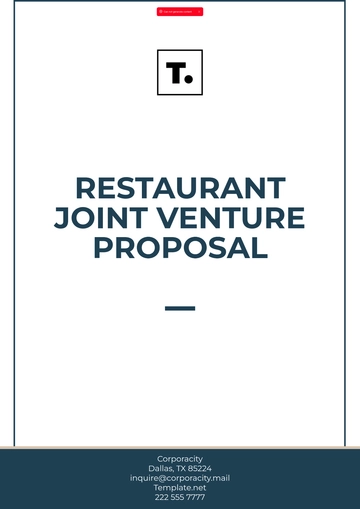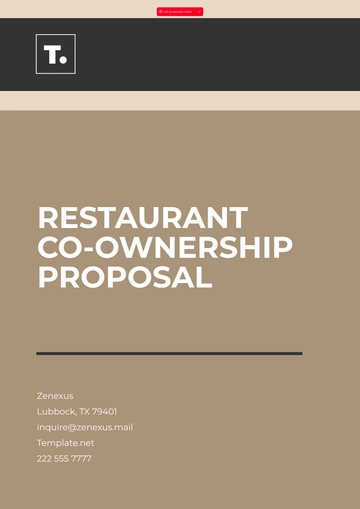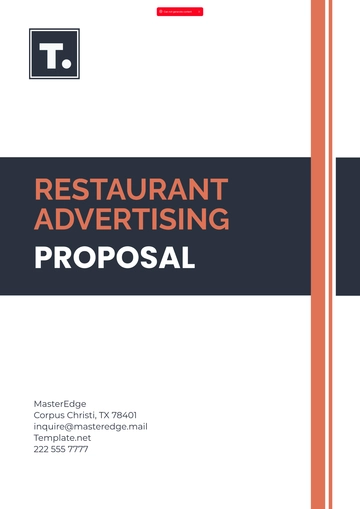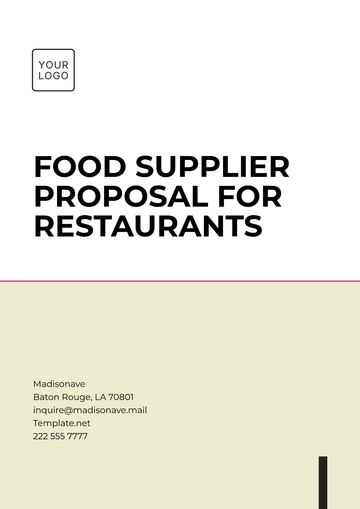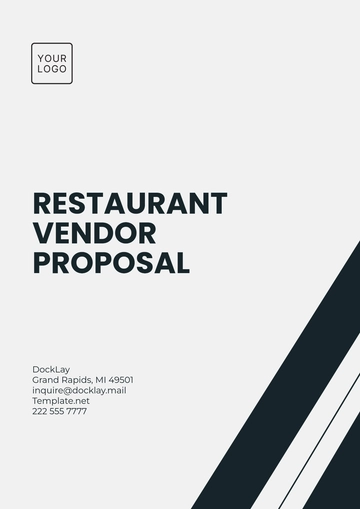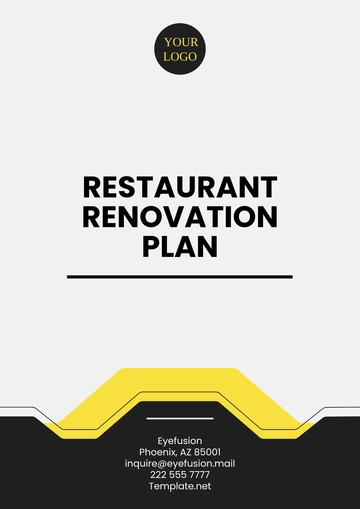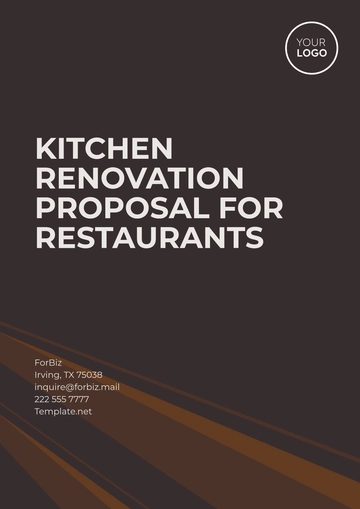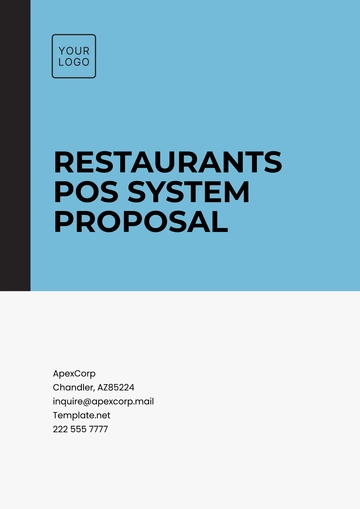Free Restaurant Sustainability Proposal
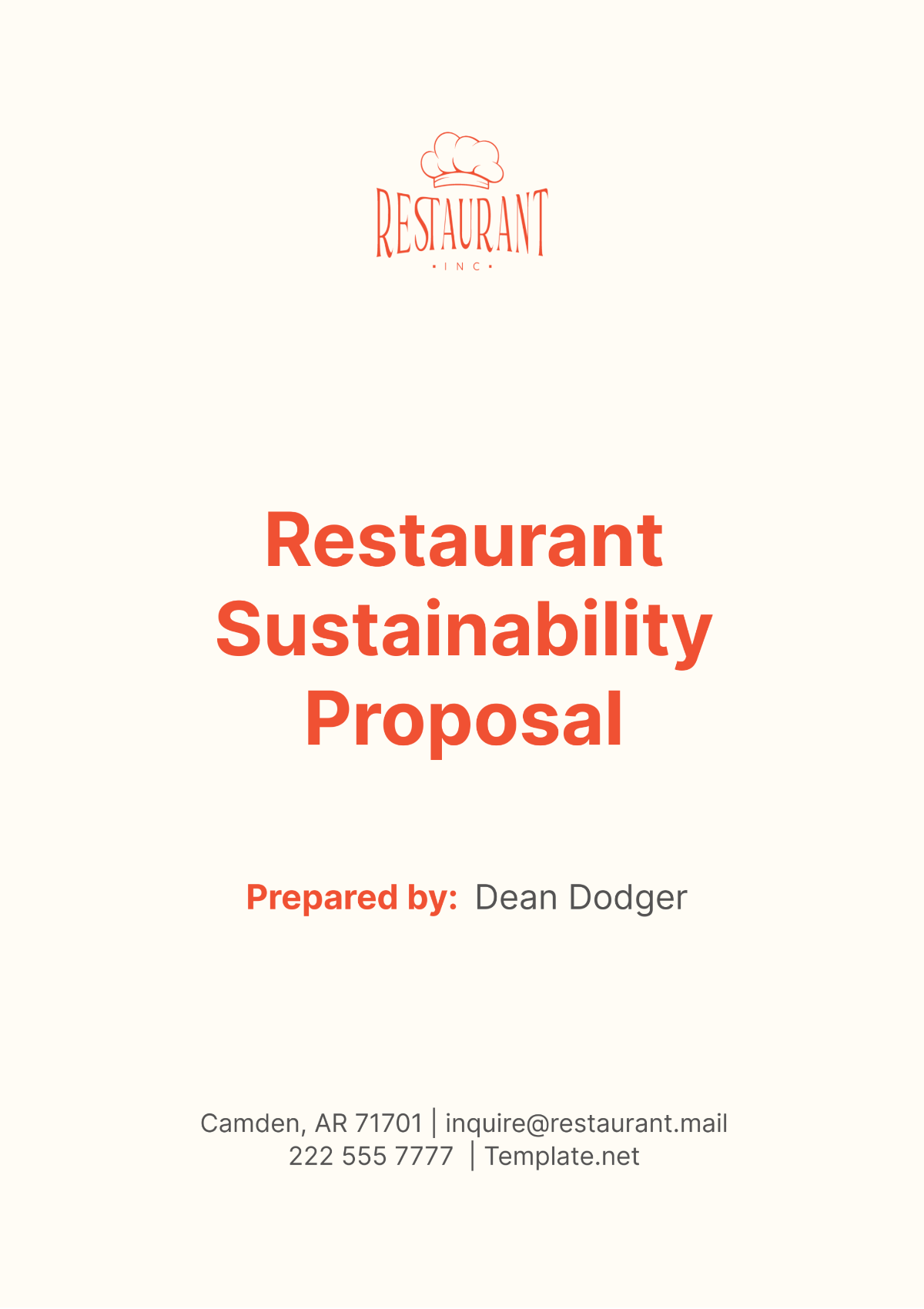
I. Executive Summary
The purpose of this proposal is to outline and implement sustainable practices within [Your Company Name]. Our goal is to enhance operational efficiency, minimize environmental impact, and promote social responsibility. By adopting the suggested measures, [Your Company Name] will not only reduce its carbon footprint but also improve its market standing and customer loyalty.
This document presents a comprehensive strategy that includes waste reduction, sustainable sourcing, energy management, and community engagement. Implementing these practices will ensure compliance with environmental regulations and align with the growing consumer preference for environmentally conscious businesses.
II. Goals and Objectives
To establish [Your Company Name] as a leader in environmental sustainability within the hospitality industry. The specific objectives include:
Decrease waste by [30%] within the next year through improved waste management strategies.
Increase the use of locally sourced and organic products by [50%] within two years.
Reduce energy consumption by [20%] over the next three years through smart technology and efficient practices.
III. Background
Established in [2050], [Your Company Name] has proudly served the [Big City] with culinary excellence and hospitality, becoming a cherished part of the local dining scene. As we celebrate our journey of culinary innovation and community engagement, we recognize the pressing need to embrace sustainability as a cornerstone of our ethos. In an era marked by environmental challenges, our commitment to sustainable practices is not just a moral imperative but a strategic imperative, reflecting our dedication to preserving the planet for future generations.
The foodservice industry stands as a significant contributor to environmental degradation, from the excessive consumption of energy to the generation of vast amounts of waste. At [Your Company Name], we acknowledge the profound impact of our operations on the environment and are determined to take proactive steps to mitigate these effects. By embracing sustainability as a guiding principle, we seek to not only minimize our ecological footprint but also inspire positive change within our industry and community.
With a deep sense of responsibility and foresight, [Your Company Name] is embarking on a transformative journey towards sustainability. Through innovative initiatives and strategic partnerships, we aim to pioneer new standards of environmental stewardship in the dining sector. By integrating sustainable practices into every aspect of our operations, from sourcing ingredients to managing waste, we are committed to fostering a more sustainable future while continuing to delight our guests with exceptional dining experiences.
IV. Proposed Strategy
The sustainability strategy for [Your Company Name] focuses on four main areas: waste management, sustainable sourcing, energy efficiency, and community engagement. Each area features specific actions designed to meet our environmental goals:
Waste Management: Implement a composting program, increase recycling efforts, and collaborate with waste removal services that prioritize environmental best practices.
Sustainable Sourcing: Partner with local farmers and suppliers who practice sustainable agriculture, and prioritize purchasing seasonal and organic produce.
Energy Efficiency: Upgrade to energy-efficient appliances, install smart meters, and utilize LED lighting throughout the restaurant.
Community Engagement: Host workshops and events to educate the community on sustainability practices and participate in local environmental initiatives.
V. Budget and Funding
Investing in sustainability is not just an ethical commitment but a strategic decision that aligns with our long-term vision for [Your Company Name]. This section details the budget and funding plan, highlighting our dedication to prudent financial management while pursuing environmentally responsible practices. Through careful allocation of resources and strategic partnerships, we aim to maximize the return on investment and ensure the sustainability initiatives are financially sustainable in the long run.
Budget and Funding
Initiative | Description | Cost |
|---|---|---|
Energy-efficient lighting upgrade | Replace traditional bulbs with LED fixtures | $[0] |
Waste reduction program | Implement composting and recycling initiatives | $[0] |
Water conservation measures | Install low-flow faucets and water-saving devices | $[0] |
Sustainable sourcing certification | Obtain certification for ethically sourced ingredients | $[0] |
Employee training | Conduct sustainability training for staff | $[0] |
Marketing and communication | Promote sustainability initiatives to customers | $[0] |
Total | $[0] |
Funding Plan
Source | Amount |
|---|---|
Owner investment | $[0] |
Grant funding | $[0] |
Operational savings | $[0] |
Total | $[0] |
VI. Monitoring and Reporting
At [Your Company Name], we recognize the importance of accountability and transparency in our sustainability efforts. To ensure the effectiveness of our initiatives and track progress towards our goals, we have established a robust monitoring and reporting framework. This section outlines our approach to measuring, evaluating, and communicating the impact of our sustainability initiatives.
A. Key Performance Indicators (KPIs)
We will develop a comprehensive set of Key Performance Indicators (KPIs) to quantitatively measure the success of our sustainability initiatives. These KPIs will encompass various aspects of our operations, including waste reduction, energy efficiency, water conservation, and sustainable sourcing. For instance, our KPIs may include:
Waste Reduction: Percentage decrease in total waste generated per month.
Energy Efficiency: Kilowatt-hours of energy consumed per square foot of restaurant space.
Water Conservation: Gallons of water used per guest served.
Sustainable Sourcing: Percentage of ingredients sourced from local and sustainable suppliers.
B. Audits and Assessments
Regular audits and assessments will be conducted to evaluate our performance against the established KPIs. These audits will involve thorough reviews of our energy usage, waste generation, procurement practices, and other relevant metrics. For example, during energy audits, we will measure electricity and gas consumption using smart meters and compare it to historical data to identify trends and potential areas for improvement. Similarly, waste audits will involve sorting and weighing different types of waste to quantify diversion rates and identify opportunities for recycling and composting. By conducting systematic assessments, we can identify trends, pinpoint areas of inefficiency, and implement corrective actions to enhance our sustainability performance.
C. Sustainability Reports
Annually, we will publish comprehensive sustainability reports that highlight our achievements, challenges, and ongoing initiatives. These reports will provide stakeholders, including customers, investors, and community members, with transparent insights into our sustainability practices and performance. By sharing our progress openly, we aim to foster trust and accountability while inspiring others to join us in our sustainability journey.
D. Stakeholder Engagement
We recognize the importance of engaging with our stakeholders on matters of sustainability. Through regular communication channels, such as newsletters, social media, and community events, we will keep our customers, employees, suppliers, and partners informed about our sustainability efforts. By soliciting feedback and incorporating stakeholder perspectives, we can continuously improve our sustainability initiatives and strengthen our commitment to environmental stewardship.
VII. Conclusion
Adopting a comprehensive sustainability strategy will elevate [Your Company Name]’s reputation, promote efficiency, and support community health. This proposal outlines a clear and actionable path towards a more sustainable future, enhancing the viability and desirability of [Your Restaurant Name] in the competitive restaurant market.
We believe that sustainable practices are essential for modern businesses, especially in the hospitality industry, where the environmental impact is significant. By accepting this proposal, [Your Company Name] will lead by example, demonstrating that environmental responsibility and business success can go hand in hand.
- 100% Customizable, free editor
- Access 1 Million+ Templates, photo’s & graphics
- Download or share as a template
- Click and replace photos, graphics, text, backgrounds
- Resize, crop, AI write & more
- Access advanced editor
Explore Template.net's Restaurant Sustainability Proposal Template – your blueprint for eco-friendly practices in the food industry. This editable and customizable template ensures clarity and viability in sustainability initiatives. Tailored for impact, it's editable in our Ai Editor Tool, offering seamless customization. Lead the way in sustainable dining with a comprehensive proposal that outlines your commitment to the planet.
You may also like
- Business Proposal
- Research Proposal
- Proposal Request
- Project Proposal
- Grant Proposal
- Photography Proposal
- Job Proposal
- Budget Proposal
- Marketing Proposal
- Branding Proposal
- Advertising Proposal
- Sales Proposal
- Startup Proposal
- Event Proposal
- Creative Proposal
- Restaurant Proposal
- Blank Proposal
- One Page Proposal
- Proposal Report
- IT Proposal
- Non Profit Proposal
- Training Proposal
- Construction Proposal
- School Proposal
- Cleaning Proposal
- Contract Proposal
- HR Proposal
- Travel Agency Proposal
- Small Business Proposal
- Investment Proposal
- Bid Proposal
- Retail Business Proposal
- Sponsorship Proposal
- Academic Proposal
- Partnership Proposal
- Work Proposal
- Agency Proposal
- University Proposal
- Accounting Proposal
- Real Estate Proposal
- Hotel Proposal
- Product Proposal
- Advertising Agency Proposal
- Development Proposal
- Loan Proposal
- Website Proposal
- Nursing Home Proposal
- Financial Proposal
- Salon Proposal
- Freelancer Proposal
- Funding Proposal
- Work from Home Proposal
- Company Proposal
- Consulting Proposal
- Educational Proposal
- Construction Bid Proposal
- Interior Design Proposal
- New Product Proposal
- Sports Proposal
- Corporate Proposal
- Food Proposal
- Property Proposal
- Maintenance Proposal
- Purchase Proposal
- Rental Proposal
- Recruitment Proposal
- Social Media Proposal
- Travel Proposal
- Trip Proposal
- Software Proposal
- Conference Proposal
- Graphic Design Proposal
- Law Firm Proposal
- Medical Proposal
- Music Proposal
- Pricing Proposal
- SEO Proposal
- Strategy Proposal
- Technical Proposal
- Coaching Proposal
- Ecommerce Proposal
- Fundraising Proposal
- Landscaping Proposal
- Charity Proposal
- Contractor Proposal
- Exhibition Proposal
- Art Proposal
- Mobile Proposal
- Equipment Proposal
- Student Proposal
- Engineering Proposal
- Business Proposal
